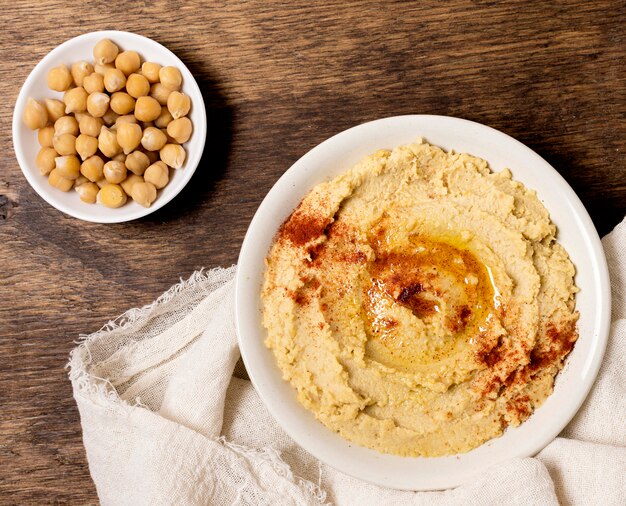Hummus is a delicious and versatile dip made from chickpeas, tahini, olive oil, lemon juice, and spices. It’s a staple in many cuisines and has gained global popularity due to its creamy texture and health benefits. Beyond its taste, hummus is known for its impressive nutritional profile. Among its benefits, it’s often considered a potential protein source. But is hummus high in protein? Let’s dive in to explore the answer.
Nutritional Overview of Hummus
Hummus is packed with nutrients that make it a healthy addition to your diet. Let’s break it down.
Macronutrient Composition
Hummus contains a balance of macronutrients:
- Protein: Chickpeas are the primary source of protein in hummus. On average, hummus provides about 4-8 grams of protein per 100 grams.
- Carbohydrates: Hummus has moderate carb content, mainly from chickpeas, offering about 12-15 grams of carbs per 100 grams.
- Fats: Hummus is rich in healthy fats, thanks to tahini and olive oil, with around 6-10 grams of fat per 100 grams.
Is Hummus Protein or Carb?
Hummus is a mix of both. Its protein content makes it appealing for vegetarians and those seeking plant-based protein. However, its carb and fat content provide energy, making it a well-rounded food.
Is Hummus High in Protein or Fat?
While hummus has decent protein levels, its fat content is slightly higher. The fats are healthy, mainly unsaturated fats that support heart health.
Is Hummus High in Protein or Carbs?
Hummus offers a balance, with more carbs than protein. However, its complex carbs and fiber make it a nutritious choice.
Protein in 100g of Hummus
On average, 100 grams of hummus contains about 4-8 grams of protein. The exact protein content depends on the brand or recipe. While it’s not as high in protein as animal products or legumes like lentils, it’s a valuable plant-based option.
Protein in Hummus vs. Peanut Butter
Let’s compare hummus with peanut butter, another popular spread.
- Hummus: 4-8 grams of protein per 100 grams.
- Peanut Butter: 25 grams of protein per 100 grams.
While peanut butter is higher in protein, hummus wins in being lower in calories and fat.
How Much Protein in Hummus Dip?
A standard serving of hummus (2 tablespoons, or 30 grams) contains about 1-2 grams of protein. While this isn’t a massive amount, it contributes to your daily protein intake.
How Much Protein Is in a Spoon of Hummus?
One tablespoon of hummus (about 15 grams) offers roughly 0.5-1 gram of protein. It’s not a protein powerhouse, but it’s a healthy, nutrient-rich addition to meals.
Hummus for Weight Loss

Hummus is often included in weight-loss diets. Here’s why:
Low-Calorie, Nutrient-Dense
Hummus is relatively low in calories but rich in nutrients. A 2-tablespoon serving has about 70 calories, making it a satisfying snack without excess calories.
Rich in Protein and Fiber
Protein and fiber in hummus help control hunger. They promote a feeling of fullness, reducing the urge to overeat.
Healthy Fats for Satiety
The fats in hummus are healthy and promote satiety, keeping you satisfied for longer.
Is Hummus High in Protein for Weight Loss?
While it’s not a primary protein source, hummus adds valuable protein to a calorie-controlled diet.
Is Hummus Good for Weight Loss?
Yes! Its balance of nutrients, combined with its versatility, makes hummus an excellent food for weight loss. Pair it with vegetables for a low-calorie, filling snack.
Hummus for Diabetics
Hummus is a suitable option for individuals with diabetes. Let’s examine its effects.
Low Glycemic Index
Chickpeas in hummus have a low glycemic index (GI). This means hummus doesn’t cause rapid blood sugar spikes.
Balanced Nutrient Profile
The combination of protein, fiber, and healthy fats in hummus helps manage blood sugar levels. Fiber slows digestion, preventing sharp glucose rises.
Is Hummus High in Protein for Diabetics?
Hummus is not excessively high in protein, but its moderate protein content supports balanced blood sugar control.
Other Benefits for Diabetics
Hummus is low in added sugars, making it a safe and healthy choice for people with diabetes. Pair it with whole-grain bread or raw vegetables for a diabetes-friendly snack.
Health Benefits of Hummus

If you’ve ever wondered, Is hummus healthy? The answer is a resounding yes. Hummus is more than just a tasty spread; it’s packed with nutrients that can benefit your body in multiple ways. Let’s break down hummus’s health benefits.
Rich in Fiber
Hummus is made primarily from chickpeas, which are loaded with dietary fiber. Fiber is crucial for digestive health. It keeps your gut moving smoothly, preventing constipation and promoting regular bowel movements. Fiber also supports the growth of healthy gut bacteria, which play a vital role in immunity and overall well-being. A serving of hummus can contribute significantly to your daily fiber intake.
A Source of Healthy Fats
The creamy texture of hummus comes from tahini, which is made from sesame seeds. Tahini and olive oil, both common ingredients in hummus, provide heart-healthy monounsaturated fats. These fats can lower bad cholesterol levels (LDL) and raise good cholesterol (HDL). Including healthy fats in your diet can also reduce inflammation and improve brain function.
Packed with Plant-Based Protein
Chickpeas are a fantastic source of plant-based protein, making hummus a go-to option for vegetarians and vegans. Protein is essential for muscle repair, immune function, and energy. While hummus may not rival animal protein sources in sheer content, it provides a balanced alternative for those on a plant-based diet.
Low Glycemic Index
Hummus has a low glycemic index (GI), meaning it doesn’t spike your blood sugar levels. This makes it an excellent choice for people with diabetes or those looking to maintain steady energy throughout the day. Pairing hummus with whole-grain crackers or veggies creates a snack that keeps you full and energized for hours.
Rich in Antioxidants and Vitamins
Hummus is a great source of essential vitamins and minerals, including folate, magnesium, and iron. Folate is crucial for cell growth and brain health, while magnesium supports muscle and nerve function. The antioxidants found in chickpeas and olive oil also help combat oxidative stress, reducing the risk of chronic diseases.
Hummus isn’t just a healthy food; it’s a powerhouse of nutrients that can enhance your overall well-being.
Pros and Cons of Hummus
When considering a food like hummus, it’s essential to weigh both its benefits and potential drawbacks. So, what are the pros and cons of hummus? Let’s dive in.
The Pros of Hummus
- Nutritious and Versatile
Hummus is nutrient-dense, offering fiber, protein, healthy fats, and essential vitamins. It fits well into various diets, from vegetarian to gluten-free. You can use it as a spread, dip, or even as a base for salad dressings. - Supports Heart Health
The monounsaturated fats in hummus help protect your heart. Consuming these fats in moderation can reduce the risk of heart disease. - Aids in Weight Management
Hummus is filling yet relatively low in calories. Its high fiber content keeps you feeling full longer, which may reduce overall calorie consumption. - Great for Blood Sugar Control
Because of its low glycemic index, hummus provides a steady energy release. It’s ideal for people looking to stabilize their blood sugar. - Easy to Make and Store
Hummus is simple to prepare at home. You can also find it in stores in various flavors, making it convenient for busy lifestyles.
The Cons of Hummus
- High in Calories
Although hummus is healthy, it can be calorie-dense due to its fat content from tahini and olive oil. Overeating hummus can lead to unintentional weight gain. - May Contain Additives
Store-bought hummus often contains preservatives, excess salt, or added sugars. These ingredients can negate some of its health benefits. - Allergy Risks
Hummus contains sesame (from tahini), a common allergen. People with sesame allergies must avoid it. - Portion Control is Key
It’s easy to overindulge when snacking on hummus. Pair it with low-calorie options like vegetables to keep your portions in check.
FAQs
Can I Eat Hummus Every Day?
Yes, you can eat hummus every day, provided it’s consumed in moderation as part of a balanced diet. Hummus is nutrient-dense and rich in fiber, healthy fats, and protein, making it a great addition to meals. However, overconsumption may lead to excess calorie intake, especially if paired with high-calorie snacks like chips.
What’s the Best Way to Eat Hummus?
The best way to enjoy hummus is as a dip with fresh vegetables like carrots, cucumber, or bell peppers. You can also spread it on whole-grain bread or use it as a topping for salads and wraps. For a creative twist, add hummus to roasted vegetables or use it as a base for creamy pasta sauces.
Is Hummus Good for Weight Loss?
Hummus can be beneficial for weight loss due to its high protein and fiber content, which promote satiety and curb overeating. Choose portion-controlled servings and pair hummus with low-calorie snacks like celery sticks. Avoid overeating hummus with calorie-dense options like pita chips to keep your weight-loss efforts on track.
Can People with Diabetes Eat Hummus?
Yes, hummus is suitable for people with diabetes. Its low glycemic index and fiber content help stabilize blood sugar levels. The healthy fats in hummus also support heart health, a crucial consideration for diabetics. Pair hummus with non-starchy vegetables to enjoy its benefits without spiking blood sugar levels.
Should I Make Hummus at Home or Buy It?
Making hummus at home is often healthier and more cost-effective. Homemade hummus allows you to control ingredients, avoid preservatives, and adjust flavors. However, store-bought options are convenient; just choose brands with minimal additives and natural ingredients. Check labels for calorie content and added oils or sugars to make an informed choice.
Conclusion
Hummus is a versatile, nutritious food that offers a wide range of health benefits. It’s rich in fiber, healthy fats, and plant-based protein. While it may not be the highest protein source, its nutritional profile and delicious taste make it a valuable addition to any diet. Whether you make it at home or buy it at the store, hummus can be your go-to dip, spread, or snack for a healthier lifestyle.

